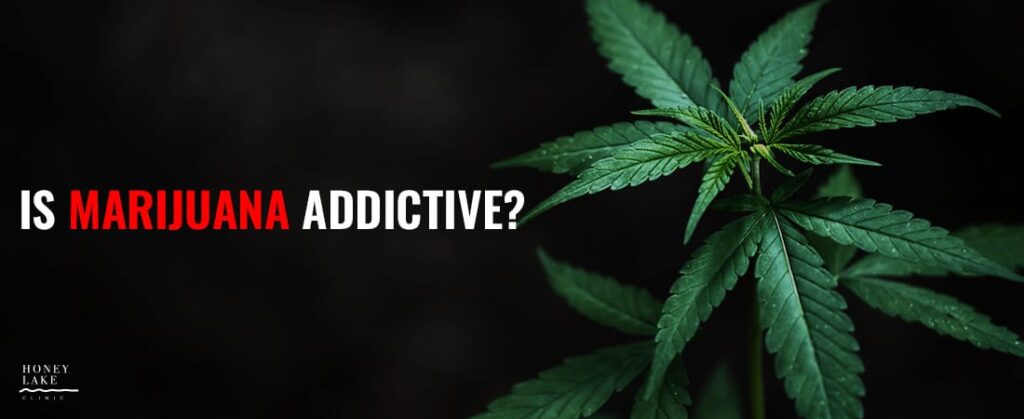Is Marijuana Addictive?
Whether or not marijuana is addictive is a hot topic of debate today, as medical and recreational use is gaining ground state by state.
Sound scientific research demonstrates that some 30% of marijuana users do develop an addiction to it, the likelihood of which increases dramatically in persons whose use before the age of 18.
Tetrahydrocannabinol, also known as THC, is the substance within marijuana that produces the high as it is inhaled, passing from the lungs into the bloodstream, and on to the brain.
THC impacts certain receptors in the brain, affecting mood, memory, thought and energy.
If you or someone you love is struggling with marijuana use, we can help. If you’d like to talk to someone confidentially, call Honey Lake Clinic right now at (844) 747-7772.
Cannabis Use Disorder
Cannabis use disorder is a diagnosis given for problematic marijuana use, introduced in the Diagnostic and Statistical Manual of Mental Disorders, fifth edition or DSM-5. Cannabis use disorders are often associated with dependence—a person often feels withdrawal symptoms when they are not using marijuana.
People who use frequently often report irritability, mood and sleep difficulties, cravings, restlessness and even certain physical discomforts which develop as they stop using marijuana.
In 2015, some 4 million people in the United States met the diagnostic criteria for cannabis use disorder according to a study done by the National Institute on Drug Abuse.
That same year, only 138,000 voluntarily sought treatment for their marijuana use.
While Marijuana may not be as life-threatening as heroin or cocaine, developing a cannabis use disorder or addiction is possible and can have an immensely negative impact on your health and life.
Marijuana: What is it?
Rising in popularity within the American counterculture of the 1960s and 1970s, marijuana is now the most commonly abused illicit substance in the United States.
Marijuana comes from the cannabis sativa plant, and refers to the dried leaves, stems, flowers and seeds from the green, leafy plant.
The most common way the drug is used is when the dried leaves from the plant are rolled into cigarettes or loaded into pipes and smoked.
The THC in marijuana produces feelings of euphoria among other effects.
Marijuana is also ingested in other forms today—waxes and oils can be vaporized, growing in popularity with the advent of e-cigarettes and vaping replacing traditional smoking.
Clients from Honey Lake has reported that Marijuana is also ingested in edibles—THC extracts baked into brownies or cooked into gummy bears, for instance.
Marijuana has many nicknames. Some street names for marijuana include:
- Mary Jane
- Weed
- Pot
- Kush
- Herb
- Bud
- Grass
- Ganja
- Hash oil
- Wax
- Dabs
Other terms related to marijuana and its abuse include:
- Joint: A marijuana cigarette
- Doobie: A nickname for a joint
- Blunt: A marijuana cigar
- Roach: The butt of a joint or blunt
- Roach clip: A small metal clip used to hold the end of a joint or blunt so the user can smoke the entire thing without burning their fingers
- Bowl: A glass pipe for smoking marijuana
- Bong: A water pipe for smoking marijuana
- Head shop: A store that sells marijuana paraphernalia
- Dime bag: A $10 bag of marijuana
- Nickel bag: A $5 bag of marijuana
- Dabbing: The act of smoking THC resin
- 420: Slang for smoking marijuana
- 4/20: April 20th, a notorious date for smoking marijuana to get high
- Brick: A large, compacted block of marijuana
Take your life back
If you’re using marijuana and you want to quit, we can help.
At Honey Lake Clinic, we believe faith-based treatment, encompassing your spiritual, physical and mental health, will provide you with the long-lasting tools and knowledge you need to make changes in your life and health.
